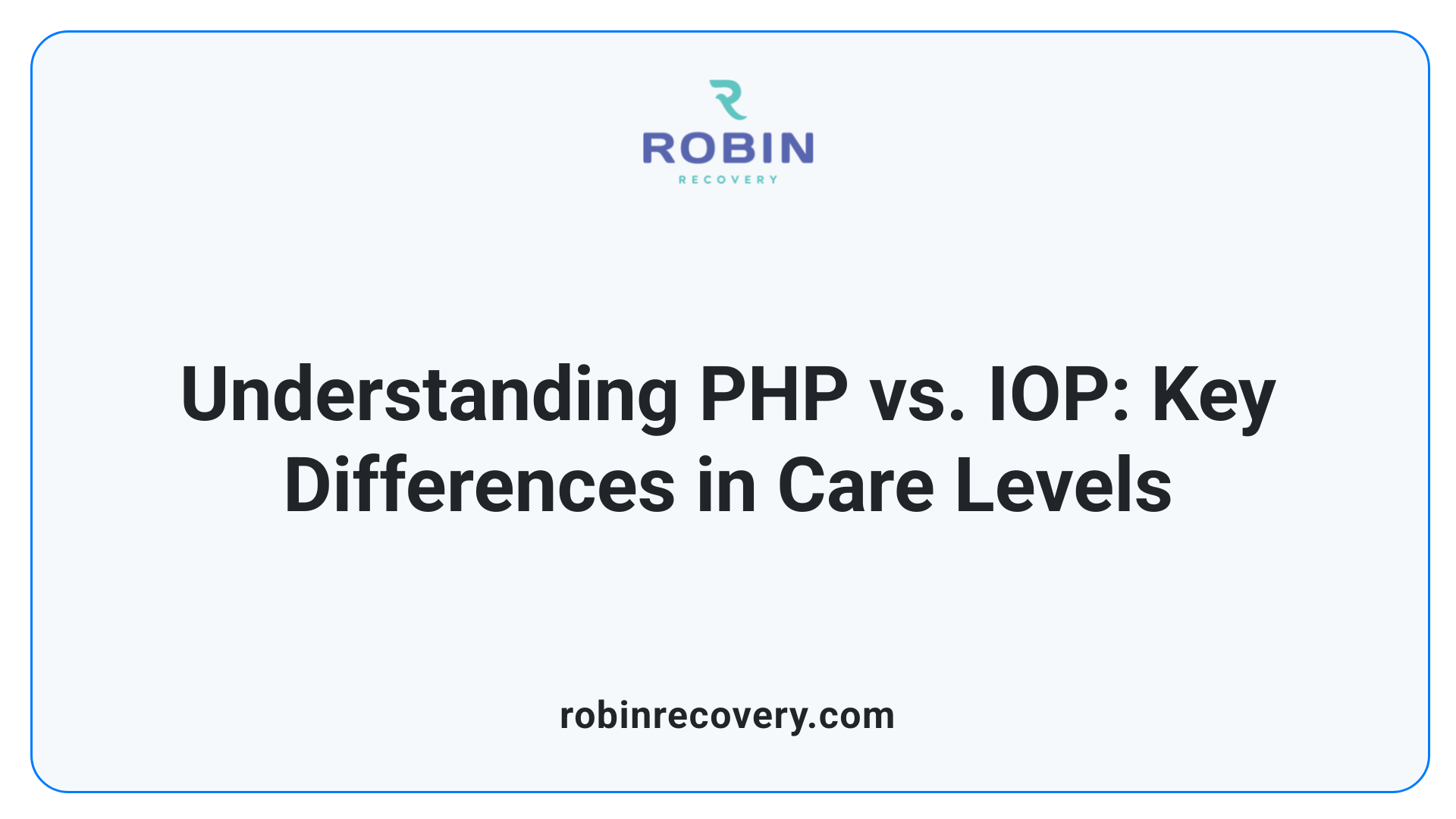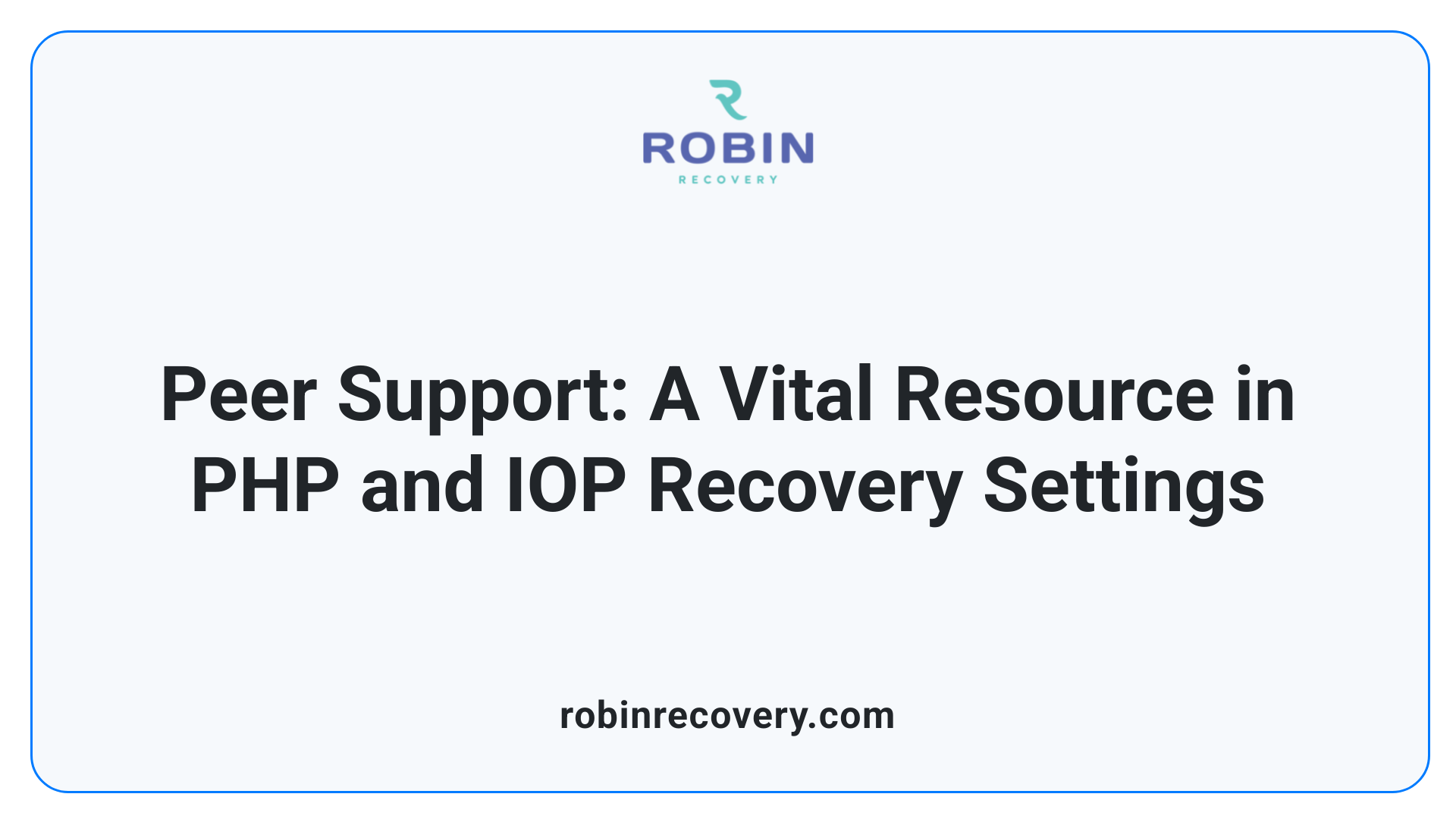How PHP and IOP Help with Dual Diagnosis Treatment

Introduction to Dual Diagnosis Treatment
Dual diagnosis treatment is a comprehensive approach to addressing individuals with co-occurring mental health and substance use disorders. Programs like Partial Hospitalization Programs (PHP) and Intensive Outpatient Programs (IOP) offer structured treatment options that cater to different levels of care needs. Understanding the nuances of these programs can help individuals and families make informed decisions about treatment plans, particularly for those living with dual diagnoses. This article explores the roles, benefits, and methodologies of PHP and IOP in the treatment of dual diagnosis, examining how these programs fit into an individual's broader continuum of care.
Differentiating PHP and IOP in Dual Diagnosis Care

What is the difference between PHP and IOP treatment?
Partial Hospitalization Programs (PHP) and Intensive Outpatient Programs (IOP) serve distinct purposes in dual diagnosis care, catering to individuals facing mental health challenges and substance use disorders. PHPs represent the higher tier of care, providing intensive daily therapy while allowing patients to return home each evening. This program specifically targets those in need of significant support, often requiring 5-6 hours of treatment five days a week.
In contrast, IOPs offer more flexibility, typically involving a commitment of 3-5 hours a few times each week. Patients attending IOPs are usually in more stable conditions, making these programs ideal for those with milder symptoms or manageable home environments. This structure allows patients to maintain daily responsibilities, such as work, while receiving ongoing support.
Treatment intensity
Program Type Care Level Support Offered PHP High Intensive therapy sessions daily IOP Moderate Flexible sessions a few times a week
Daily schedule & commitment
PHP Sessions: 5-6 hours per day, 5-6 days a week.
IOP Sessions: 3-5 hours per session, 3-4 times a week.
Both programs incorporate therapy types like individual counseling and group therapy, focusing on addressing both addiction and related mental health issues. Understanding these differences can inform treatment decisions based on individual needs.
Role of PHP and IOP in Dual Diagnosis Recovery

How do PHP and IOP programs assist individuals with co-occurring mental health and substance use disorders?
Partial Hospitalization Programs (PHP) and Intensive Outpatient Programs (IOP) play a vital role in the recovery of individuals facing both mental health and substance use disorders.
PHP: Intensive Support
PHP offers intensive therapy with daily sessions, allowing participants to address their dual diagnosis while returning home each night. This structured approach is beneficial for individuals needing more comprehensive support to manage withdrawal symptoms and cravings. It involves a blend of individual counseling, group therapy, and even medication management, catering specifically to those with complex needs.
IOP: A Flexible Approach
On the other hand, IOP provides a flexible format with fewer sessions, typically 3-5 times per week. Clients engage in group therapy and individual counseling while maintaining their daily responsibilities. This format is particularly effective for those stabilizing their treatment without the need for constant supervision.
Feature PHP IOP Session Frequency 5-6 days/week 3-5 days/week Therapy Type Intensive (individual & group) Group & individual Flexibility Less flexible (structured) More flexible Ideal For Significant support needed Daily life management
Both PHP and IOP focus on integrated treatment plans, acknowledging the interconnectedness of mental health and substance use recovery. This approach helps clients build coping strategies and fosters accountability, enabling them to lead healthier, more fulfilling lives.
Exploring Treatment Methodologies in PHP and IOP

What are the treatment methodologies associated with PHP and IOP for dual diagnosis?
PHP (Partial Hospitalization Program) and IOP (Intensive Outpatient Program) are vital treatment methodologies designed for individuals facing dual diagnosis, which includes both mental health and substance use disorders. Both of these programs prioritize structured treatment while allowing patients to balance their personal lives without the need for 24/7 supervision.
Therapies used in PHP and IOP
Both PHP and IOP utilize evidence-based therapies, focusing on methods such as:
- Cognitive-Behavioral Therapy (CBT): Helps patients alter negative thought patterns and develop effective coping mechanisms.
- Dialectical Behavior Therapy (DBT): Aims to improve emotional regulation and interpersonal effectiveness.
- Motivational Interviewing: Encourages individuals to explore their feelings towards change and build motivation for recovery.
Each program can evolve these methodologies depending on the patient's progress and specific challenges.
Treatment personalization
Personalization is key in both PHP and IOP. Treatment plans are tailored based on:
- Individual assessment of psychological needs.
- Severity of symptoms, determining the amount of structured support required.
- Personal circumstances, allowing flexibility to accommodate work or family commitments.
This individualized approach empowers patients, enhancing their recovery journey.
Comparative care levels
The distinction between the two programs is significant:
- PHP offers a higher level of care, typically requiring daily attendance for 5-6 hours and is suitable for individuals needing substantial support and structure.
- IOP endorses a less intensive format, allowing for 3-5 therapy sessions weekly, giving participants the flexibility to manage daily responsibilities.
In conclusion, the choice between PHP and IOP should depend on the individual's needs, symptom severity, and treatment goals, ensuring they receive the best possible care during their recovery journey.
PHP and IOP: Components of the Continuum of Care

How do PHP and IOP function within the continuum of care for dual diagnosis?
Partial Hospitalization Programs (PHP) and Intensive Outpatient Programs (IOP) play critical roles in the continuum of care for individuals facing dual diagnosis, where mental health disorders coexist with substance use disorders.
The Role of PHP and IOP in Recovery Journey
PHP provides a higher level of care than IOP, requiring participants to engage in structured therapy sessions for approximately 20 hours per week. This typically includes individual counseling, group therapy, and medical oversight to handle withdrawal symptoms and mental health issues effectively.
IOP, on the other hand, is geared towards those who can handle more independence while still requiring support. Sessions occur around three to five times a week, allowing individuals to maintain daily responsibilities while receiving assistance on coping strategies and relapse prevention techniques.
Transition between Treatment Stages
The transition from PHP to IOP is designed as a gradual reintegration into everyday life. PHP often serves as a step-down from inpatient care, facilitating a smoother move back to outpatient therapy. This designed progression helps individuals reinforce newly learned skills, contributing to longer-term recovery goals.
Integrative Support Systems
Both PHP and IOP integrate various support systems, including peer support and life skills training, which are vital for fostering community and understanding among participants. These programs emphasize collaborative therapy approaches, ensuring that both mental health and substance use issues are addressed simultaneously.
In summary, by offering structured yet flexible options, PHP and IOP provide essential support that aligns with the diverse needs of individuals seeking recovery.
The Importance of Peer Support in PHP and IOP

What role do peer supports play for clients with dual diagnoses in PHP and IOP?
Peer supports are instrumental in aiding clients with dual diagnoses in Partial Hospitalization Programs (PHP) and Intensive Outpatient Programs (IOP). These support systems significantly enhance recovery journeys, reinforcing individuals’ well-being.
Social support from peers and treatment providers is associated with improved mental health outcomes and a reduction in substance use. Clients frequently express that peer relationships assist them in managing stressful situations, which can be particularly beneficial given the complexities of dual diagnoses.
Social networks and treatment outcomes
Engagement in recovery-oriented peer networks creates a safety net, helping individuals feel understood and less isolated. In fact, specialized mutual aid groups that cater to those dealing with co-occurring disorders are often more effective than traditional self-help groups. These tailored environments foster camaraderie and shared understanding among participants.
Community and shared understanding
The significance of strong social support networks cannot be overstated; they are crucial in improving quality of life for those overcoming addiction and mental health challenges. Clients benefit from feeling connected within a community that acknowledges their struggles, thus promoting sustained recovery. Through shared experiences, individuals learn valuable coping strategies that help mitigate their dual diagnoses.
Overall, the presence and quality of peer support can make a profound difference in the recovery journey within PHP and IOP settings.
Interventions for Dual Diagnosis in PHP and IOP
What interventions are used in PHP and IOP for dual diagnosis?
Interventions in Partial Hospitalization Programs (PHP) and Intensive Outpatient Programs (IOP) focus on an integrated approach that addresses both mental health disorders and substance use issues. The same treatment team collaborates to ensure comprehensive care tailored to individual needs.
Key psychosocial interventions include:
- Family Therapy: Engaging family members in treatment promotes support systems that enhance recovery.
- Motivational Interviewing (MI): This technique helps strengthen the individual's motivation for change by exploring ambivalence toward recovery.
- Cognitive-Behavioral Therapy (CBT): CBT is utilized to help patients identify and alter negative thought patterns that may contribute to both their mental health and substance use issues.
- Integrated Group Therapy (IGT): Specialized group sessions foster peer support while addressing the simultaneous challenges of dual diagnosis.
- Interpersonal Social Rhythms Therapy (IPSRT): This method helps individuals stabilize their daily routines, which is crucial in managing mood disorders in conjunction with substance use.
Non-pharmacological methods
While pharmacotherapy plays an important role in managing acute symptoms, non-pharmacological methods are essential for long-term recovery. These approaches include counseling and skills training that empower individuals to manage their conditions effectively.
Comprehensive psychosocial assessments are also conducted, evaluating the patient’s motivation for change and the intricate ways their disorders affect overall health.
These integrated interventions, supported by evidence-based practices, significantly enhance recovery outcomes for individuals experiencing dual diagnosis.
Conclusion: Moving Towards Recovery with PHP and IOP
Partial Hospitalization Programs (PHP) and Intensive Outpatient Programs (IOP) provide vital support for individuals navigating the complexities of dual diagnosis. These programs offer a structured and integrated approach that targets both mental health and substance use disorders, helping patients develop the skills and resilience needed for long-term recovery. Through comprehensive care, including therapy, peer support, and personalized interventions, PHP and IOP play crucial roles in the continuum of care, assisting participants in achieving stability and fostering hope for a healthier future. By understanding the particular features and benefits of PHP and IOP, individuals and families can make informed decisions on their path toward recovery.
References
- Addiction Treatment Explained: When to Choose PHP or IOP
- Outpatient Programs: PHP vs IOP | Turning Point Care Center
- Why Choose Dual Diagnosis PHP for Substance Abuse
- Dual Diagnosis Intensive Outpatient Program (IOP) - UCLA Health
- Help for Dual Diagnosis | CAST Treatment Centers
- PHP vs IOP Addiction Treatment: Which is Right for You?
- IOP vs PHP: 6 Ways to Choose the Best Program for Teens
- Dual Diagnosis Treatment in Partial Hospitalization
- PHP VS. IOP: Key Differences In Treatment Options
- Benefits of Dual Diagnosis IOP for Long-Term Recovery | Flatirons
